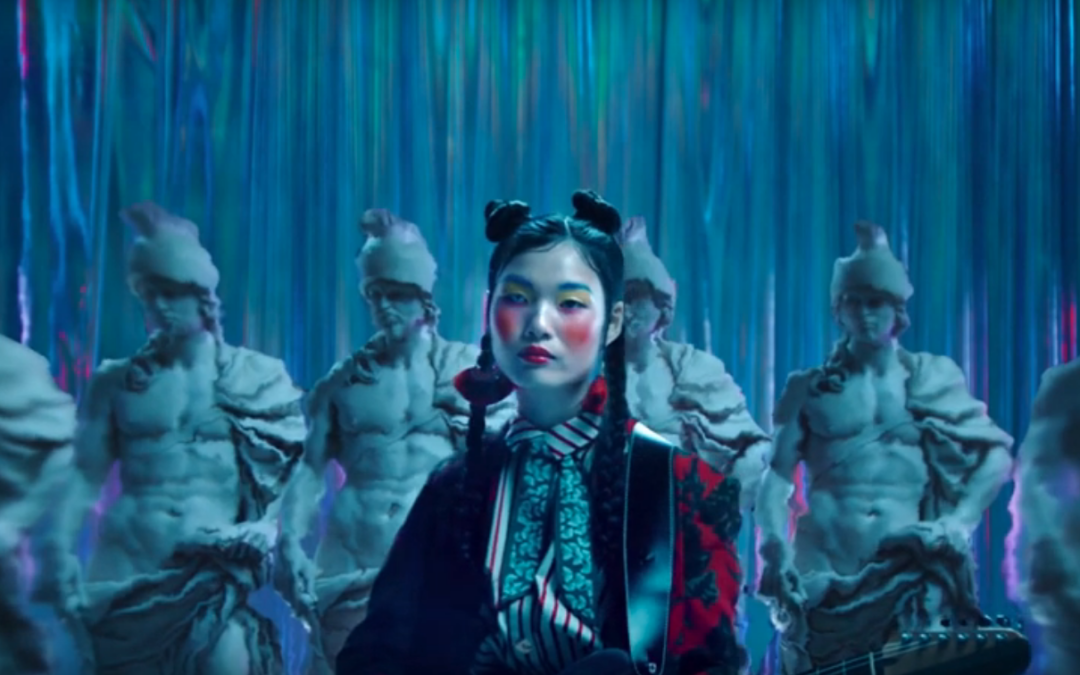“I wanted to celebrate outsider music from Asia.” —— Saphy Vong, founder of Chinabot label
Saphy Vong is Subtropical Asias’ brother in spirit. Just like us, he tries to connect underrepresented artists to each other and to a wider global audience. His label Chinabot has gathered a diverse spectrum of musicians from Asia and the Asian diaspora. We follow each others’ work for a while now, and are therefore very happy to finally have had a chat with him. Read his insights about Asian stereotypes, the lack of diversity in the experimental electronic scene and overall shifts in global pop culture in our interview.

Saphy Vong, the founder of Chinabot label
Subtropical Asia: What was the initial idea for “Chinabot” and how did it become reality? Where does the name come from?
Saphy Vong: I was born in a Thai refugee camp in Phanat Nikhom to Cambodian parents and moved to France when I was a small baby. I played in some hardcore and punk bands growing up before getting into experimental electronic music. I toured and made music for years before starting Chinabot, and when I was touring with my project Lafidki, I met so many interesting people. I realized that in Europe now, in this experimental electronic music scene, we need to open doors to other contianents. There is an erasure of Asian people’s narratives from electronic music and I express the necessity to rewrite these voices into history. Creating a platform specifically dedicated to drawing marginalized identities into the mainstream has been integral to this. I’ve always been a part of the scene, but I noticed that you had to specifically look, and look harder, for Asian artists.
The initial idea for the label was born from my frustration at the lack of diversity in the experimental electronic scene, especially when it came to the gatekeepers of taste and power like record labels. I felt the need to put a few ideas and people I believed in together. And also to put out my friends’ music. No one was interested in putting out releases by artists I like. So I decided to do it myself. At first it wasn’t so much done out of responsibility, but it was obvious that if you wanted something to happen you had to start it and not wait around for other people to do it for you. It was the obvious choice and the combination of the artists seemed to work. I wanted to establish a community to celebrate outsider music from Asia.
There was quite a narrow idea of Asian music – mostly Japanese and Chinese references – and the people developing and supporting artists in Asia were not often Asian. Of course, people have been doing great work for years supporting artists in Asia. But it felt like it was finally time for a label which had more of a spirit of collectivity , and was run by somebody who understood what it was like to really be an Asian artist. I started the label by myself but I was helped a lot by the whole network of artists who are now under the Chinabot label. I also benefit from the support of some venues like Cafe Oto in London who have always been really open to putting on gigs from Chinabot artists. It’s also been great to work with other collectives like Eastern Margins in London.
The name comes from a Cambodian man I met in New Zealand called Chinaboth. It’s also playing with the idea of Asian artists as a homogenous, Chinese group. The name of the label is a kind of sarcastic about how the west perceive Asians – it was Yellow Peril in the past and now Chinabot, even more since the outbreak happened, the hashtag of Chinabot is always linked to pro-Trump racists comments, I also link the idea of being a fake virus, spam who scares western countries in modern times with technologies.

Chinabot’s logo
You call Chinabot “a digital diaspora community“. Can you explain what that means to you?
Because of the internet, we’ve been able to get our message out and stay true to what we believe in and still work independently
It wears many hats – label, platform, community. We have artists from all across Asia, and all across the world too as more and more children of the Asian diaspora join us. I find most of my artists online and that’s primarily how we communicate, aside from the artists who live in London. Of course the internet has given us all an opportunity to connect, explore each other’ s music and support each other. But there are limits too – not everyone is connected to the music sharing infrastructure and I would like to travel more to find people who maybe wouldn’t think to post their music onto Sound Cloud. Touring and meeting artists still remains a highlight although I do see ourselves as a primarily digital network.

Chinabot’s artist TAVISHI,who works as a biologist, draws inspiration from scientific research data as well as her own experience as a queer Indian woman living in America.

Chinabot’s artist FAUXE, the singaporean producer is one of the hardest working and prolific in the scene.
What does an artist have to have to be interesting for you to approach? How do you usually get in contact with them?
Chinabot is ultimately really subjective – and it’s hard to define your own taste! I like to be surprised by an artist and hear something new. I like really unique people too, unbelievable characters, when they feel magical to me and having a playfulness, purpose and sense of humour in music are also things I like to hear. But nothing specific – I really enjoy the diversity of the artists on Chinabot.
We are usually friends. I met a lot of them on tour, sometimes online. I just like unique sound and identity but the most important thing is to be a humble person without a big ego. I’ve never been interested in big artists, or names.
You want to bring Asian artists together. Did you feel that Asian artists are not represented enough within the global pop culture? Can you feel a shift happening?
I suppose experimental music remains a niche within wider pop culture. And that has historically been very Eurocentric although that is rapidly changing with more interest in the unique perspective and musical heritage Asian artists can bring. In terms of global pop culture, I feel like Asian artists are also being recognized with the rise of K-Pop, although that is quite a niche too. In France, where I am from, it is still hugely ghettoised – I was often the only Asian person at gigs and on stage, and I’m sure that has not changed much. The diaspora is still finding a voice within cultures like France which do not embrace diversity. In France there’s no exchange, and they just want to show the positive side from colonial times… But we deserve to be heard too.
What are the typical Asian stereotypes you want to get rid off or prove wrong with your label?
The idea that all Asia is one culture, a bunch of bundled-together stereotypes taken mostly from China and Japan. I suppose some people in the West perceive Asian people as not being spontaneous, creative and willing to take risks, which I think every artist on Chinabot does.
The Cultivation Theory suggests that exposure to media, over a long period, subtly cultivates viewers’ perceptions of reality. And the shaping effect the media has had on perceptions of Asians has been decidedly one-note on screens. Famous Characters written by white people continually reinforce the idea that Asian are nerdy, martial arts experts, repressed by their families, destined to be recruited by a terrorist organization…

Chinabot’s artist Jaeho Hwang, he is a London-based, South Korean composer and visual artist inspired by the Buddhist concept of impermanent selfhood

Chinabot’s artist SABIWA, she is working in between Berlin, Taipei and Torino as audio-visual producer.
Asia has a wide geographical range. What do you think have the Asian artists on your label in common? What is different from for example western artist, let’s say when it comes to sound, experience, creative sensitivity etc.?
I respect all artists as individuals and I don’t necessarily think they have much in common in terms of their artistic perspective. I think we are all united in making unique and interesting music in our own way. I have some artists who, like me, are from the diaspora and have been immersed in mixed eastern/western culture all our lives.
Saying that, there are some artists who consciously resist the Western canon and tradition. Asian musical traditions have been explored less in experimental music and there is still so much to play with and discover.
I think the artists on Chinabot are just honest with their art and it’s really important. I’m glad to see Asian artists re-exploring their own culture more nowadays.
Is there a country, whose artists you perceive as especially influenced by their origin, historical or politically?
Pisitakun from Thailand, making art is really dangerous if you criticize the monarchy, he had to leave the country in the past because of his art. His next album will be released soon on Chinabot and it’s quite political.

Chinabot’s artist Pisitakun, his works are based on political speculation and the external and internal frustrations artists are subject to.
Pisitakun also build his new album around the death of his father. How did he approach this very personal and intimate topic artistically?
I played with Pisitakun in Bangkok a while ago before releasing SOSLEEP. He released a track on our first compilation, then “Dangrek Mountains” which was the first edition of our split series, on the cover you can see him shaving off his beard and hair, spending a day and a night as a monk to make good merit for his father’s spirit. He was starting his Europe tour, his dad passed away just a few weeks before and he just told me he wanted to do his next album about his father’s death. It was sad but gave him energy. He approached it directly and very bravely. He recorded the sounds of his father’s heart monitor machine, as well as the funeral chants. He was close with his father and despite the sadness, he transformed the experience into a brilliant and creative record.

PISITAKUN’S NEW ALBUM—INSPIRED BY THE DEATH OF HIS FATHER—MIXES POUNDING TECHNO, TRADITIONAL THAI INSTRUMENTS AND SOUNDS OF MACHINERY AND HARDWARE RECORDED IN A HOSPITAL ROOM.

Chinabot Radio Episode 6 :Pisitakun Mix
How do you imagine the shifts in global pop culture in 20 years from now? What do you hope will happen? what is your biggest fear?
Anything could happen! But I like uncertainty. Most of all I hope that people in countries like Cambodia are able to live in a more equal and less corrupt society, for everybody’s sake but also so that a diverse network of artists can support themselves and develop. It’s hard when the local audience and the artists themselves are severely overworked and underpaid – aside from having less money to spend on music, it is harder to have energy to take musical risks, or to try new things which might not end up succeeding. A lot of people still have to focus first on survival. I also hope that traditional music isn’t forgotten – it still has a lot to give us.
Learn more about Chinabot Label, go to : https://www.chinabot.co/
Enjoyed this article? Like Subtropical Asia on Facebook or follow us on Instagram.

